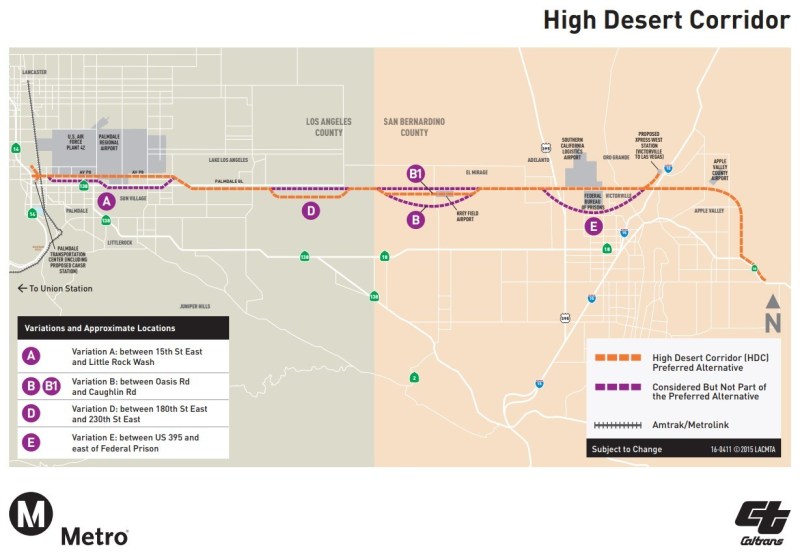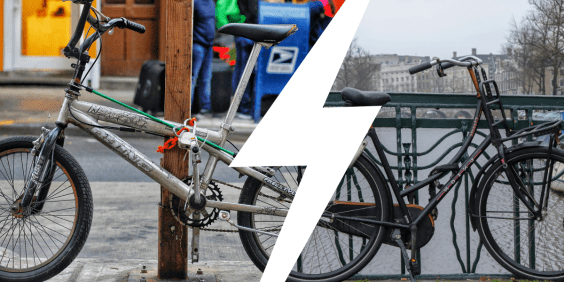Note: Metropolitan Shuttle, a leader in bus shuttle rentals, regularly sponsors coverage on Streetsblog San Francisco and Streetsblog Los Angeles. Unless noted in the story, Metropolitan Shuttle is not consulted for the content or editorial direction of the sponsored content.
A new report out today names southern California's planned High Desert Freeway as one of the United States' top nine highway boondoggles. The Highway Boondoggles 5: Big Projects. Bigger Price Tags. Limited Benefits. report was published by CALPIRG Education Fund and Frontier Group. The report emphasizes that these projects cost multiple billions - to build and maintain - while worsening congestion and harming communities and the environment.
Streetsblog readers may be aware of the High Desert Freeway, a misguided project pushed by road-builders at Metro and Caltrans. It is perhaps most renowned for its ridiculous psychedelic Brad the tortoise EIR cover art.
The $8 billion, 63-mile highway would connect the north L.A. County cities of Palmdale and Lancaster with San Bernardino County cities of Victorville, Apple Valley, and Adelanto. Because it spans two counties, the project is managed by the High Desert Corridor Joint Powers Authority. The L.A. County portion of the project has Metro Measure M sales tax funding: $170 million available starting now, slated for property acquisition, and $1.8 billion scheduled for 2063-2067 for construction.
The High Desert Freeway has been billed as "L.A. County’s first new freeway in 25 years." This is because L.A.'s highway builders have instead squandered tens of billions of dollars widening existing highways. These ongoing freeway mega-projects were predicted to solve congestion but have made it worse.
Adding highway miles and lanes are antithetical to California's climate goals. From CalPIRG's report:
...for California to truly become a low-carbon state, it must work to reduce driving. Transportation is responsible for 46 percent of state carbon dioxide emissions, and the 151 million metric tons of on-road transportation emissions released in 2016 were more than the total, economy-wide emissions of states like Georgia, North Carolina, and New Jersey. While electric vehicles are an important tool to reduce transportation emissions, electrifying the existing 35 million vehicle fleet will take time, and walking, biking, and transit can cut emissions immediately and play a role in the state’s long-term emissions reduction strategy.
Because the highway builders can read this writing on the wall, they know that the nation's era of massive highway expansion will have to come to an end. In southern California, from the ports to the San Fernando Valley, freeway expansion projects are getting canceled, with land planned to be re-purposed for community needs.
To stave off opposition, High Desert hucksters have smeared lots of lipstick on their pig. The project is not just another "freeway," but instead a "multi-purpose corridor" replete with bike path, solar panels, and high-speed rail running down the median.
What could possibly go wrong with rail running in a freeway median? Other than, say, trucks crashing onto the rails and hellish noise and pollution, it might be nice.
High Desert Corridor high-speed rail could be an important connection for California's network.
California High-Speed Rail will include a station in Palmdale. Proposed XpressWest high-speed rail would connect Victorville to Las Vegas. The High Desert Corridor is one way to close a key gap - to connect major California population centers to Las Vegas.
While freeway builders tout the rail connection benefits, the CalPIRG report points out some fallacies in claims of
...a benefit of providing “improved access and connectivity to” the proposed XpressWest high-speed rail route, which would be on a route parallel to the proposed highway. Such a rail route could, on its own, be an effective way to promote low-carbon travel. In contrast, the highway would promote sprawling development less amenable to rail travel, and will also compete with, not provide service to, those rail stations.
Why not scrap the highway and just build the rail?
Another High Desert Freeway nod to environmental goals is adding “green energy features” - mostly solar panels in the excessive right-of-way, which is 300-500 feet wide, for eight 12-foot car lanes. Again from the report: "it is unclear how green energy features like solar panels would benefit from the construction of a highway, or why existing highways could not provide similar building opportunities."
Read the full CALPIRG Education Fund and Frontier Group Highway Boondoggles report.






